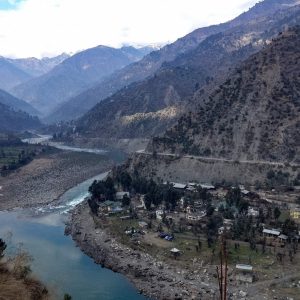Federal Water Tap, January 28: Navy Will Deny Camp Lejeune Contaminated Water Claims
The Rundown
The Navy secretary says more than 4,400 Camp Lejeune medical claims will be turned down. A three-week budget extension ends the partial government shutdown, for now. The nation’s spy agencies warn that migration is a top national security issue. House members announce a PFAS task force. A Michigan representative introduces a bill to study the economic and environmental consequences of a Line 5 oil spill. The Bureau of Reclamation offers $9 million in drought resilience grants. And lastly, the clock is ticking for two anticipated EPA drinking water actions.
“Increasing migration and urbanization of populations are also further straining the capacities of governments around the world and are likely to result in further fracturing of societies, potentially creating breeding grounds for radicalization. Pressure points include growing influxes of migrants, refugees, and internally displaced persons fleeing conflict zones; areas of intense economic or other resource scarcity; and areas threatened by climate changes, infectious disease outbreaks, or transnational criminal organizations.” — National Intelligence Strategy, a document published every four years that outlines strategic priorities for the nation’s 17 spy agencies.
By the Numbers
February 15: Date the continuing resolution to reopen the federal government ends. (Congress/White House)
$9 million: Grant funding available to water agencies, irrigation districts, Indian tribes and others in the western states for “drought resiliency” projects. Those projects, up to 15 of which will be selected for funding, can include better water supply forecasting, lowering reservoir intakes so that water from deeper depths can be pumped, water storage tanks, groundwater recharge, and more. To be funded, the projects need to be part of an existing drought plan. Grant funds are capped at $750,000 and will not exceed 50 percent of the project cost. (Bureau of Reclamation)
News Briefs
Camp Lejeune Water Contamination
There is no legal basis for more than 4,400 medical claims related to contaminated drinking water at Camp Lejeune, the Department of the Navy announced.
Richard Spencer, secretary of the Navy, told NBC News that people filing claims, many of whom had waited years, needed an answer. “I wanted to come to closure on this,” he said. “Kicking it down the road provided no value.”
Jerry Ensminger, a Camp Lejeune veteran who has led the fight to hold the military accountable for water contamination at the North Carolina base, said that he and others would not give up.
“This is just one more hurdle that a guilty party is throwing in our path towards justice,” he wrote in a Facebook post.
The base’s drinking water was contaminated with volatile organic chemicals that were discovered in the water supply in the 1980s. Officials determined that eight diseases, including Parkinson’s, liver cancer, bladder cancer, and non-Hodgkin’s lymphoma, are strongly connected to exposure to the chemicals.
The Obama administration, in 2017, authorized $2 billion for health care for veterans who were exposed to the chemicals at Camp Lejeune. Veterans with one of the eight identified diseases who served at the base for more than 30 days are eligible for Department of Veterans Affairs health care.
PFAS Task Force
A group of 20 House members established a congressional task force on a hot-button drinking water issue: contamination from PFAS chemicals.
Led by Rep. Brian Fitzpatrick (R-PA) and Rep. Dan Kildee (D-MI) the group’s goals center on behind-the-scenes work. They aim to educate other members of Congress on PFAS issues, introduce legislation, and push for more federal funding to clean up contaminated sites.
Earlier this month, Kildee and others introduced a bill to require the EPA to list PFASs as hazardous substances under CERCLA, the federal environmental cleanup law.
Line 5 Oil Spill Study
Line 5 is the pair of pipelines that move oil and natural gas liquids beneath the Straits of Mackinac, which connects lakes Michigan and Huron. Academic researchers say it’s the worst spot in the Great Lakes for an oil spill.
Rep. Debbie Dingell (D-MI) introduced a bill that requires the Department of Transportation to study the environmental and economic consequences of a Line 5 oil spill.
In context: Line 5 Oil Spill Would Inundate Large Swathes of Great Lakes Shoreline
Studies and Reports
National Intelligence Strategy
Risks to U.S. national security are multiplying in a rapidly changing world, according to a strategic assessment published by the federal government’s 17 intelligence agencies.
The strategy, published every four years, sets out the organizational priorities for the CIA, NSA, and other agencies. It’s essentially a planning document for how the agencies will coordinate to meet objectives like counterterrorism and cybersecurity.
Unlike the previous strategy, which was released in 2014, this version does not explicitly mention the competition for food, water, and energy as a factor for regional conflict.
Instead, it focuses on migration and urbanization, acknowledging that a changing climate, resource scarcity, disease outbreaks, and conflicts are uprooting people across the continents.
Just a week ago the Government Accountability Office criticized the State Department, U.S. Agency for International Development, and Defense Department for not considering migration when assessing climate risks.
The Senate Select Committee on Intelligence will hold a hearing on the national intelligence strategy on January 29.
The directors of a half dozen agencies, including the CIA, FBI, and NSA, will testify. Afterward there will be a closed session for committee members.
On the Radar
Lead and Copper Rule Revision and PFAS Management Plan
The EPA is on the clock for two anticipated drinking water actions.
One is the long-awaited, long-delayed revisions to federal rules for lead and copper in drinking water. Last fall, the agency said it would release the draft proposal in February 2019. The shutdown could mean additional delay.
The other is the agency’s plan for responding to PFAS chemicals. Agency officials told Congress last September that the plan would be released by the end of 2018. But then Peter Grevatt, head of the drinking water office, retired and the agency was caught in the partial government shutdown.
During his confirmation hearing, Andrew Wheeler, nominated to helm the EPA, said the plan would be released after the shutdown ended.
In context: In Senate PFAS Hearing, Government Officials Say Regulatory Response Will Take Years
Federal Water Tap is a weekly digest spotting trends in U.S. government water policy. To get more water news, follow Circle of Blue on Twitter and sign up for our newsletter.
Brett writes about agriculture, energy, infrastructure, and the politics and economics of water in the United States. He also writes the Federal Water Tap, Circle of Blue’s weekly digest of U.S. government water news. He is the winner of two Society of Environmental Journalists reporting awards, one of the top honors in American environmental journalism: first place for explanatory reporting for a series on septic system pollution in the United States(2016) and third place for beat reporting in a small market (2014). He received the Sierra Club’s Distinguished Service Award in 2018. Brett lives in Seattle, where he hikes the mountains and bakes pies. Contact Brett Walton





Leave a Reply
Want to join the discussion?Feel free to contribute!